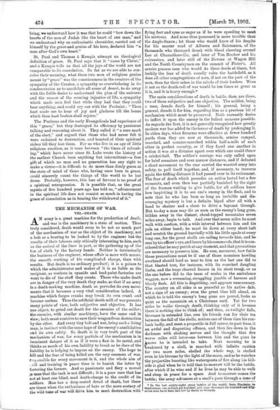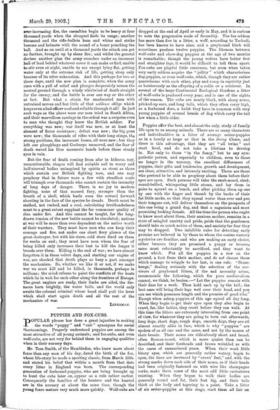THE MECHANISM OF WAR.
VIII.—DEATH.
AN army is a great machine for the production of death, and war is the machinery in a state of motion. Thus truly considered, death would seem to be not so much part of the mechanism of war as the object of its machinery, not a bolt or a bearing to be looked to by the engineer but the results of their labours only ethically interesting to him, such as the arrival of the liner in port, or the gathering up of the ton of cloth by the factory hands. Neither is intrinsically the business of the engineer, whose affair is more with means, the smooth working of his complicated charge, than with results. But death is no ordinary product; it is a poison to which the administrator and maker of it is as liable as the recipient, as workers in cyanide and lead-paint factories are wont to die of the stuff they create. Those who make death are in danger of the very death they make, so that if an army is a death-making machine, death so pervades its own move- ments that it becomes a very vital consideration indeed. A machine which forges cranks may break its own crank and become useless. Thus the artificial death-mill of war presents many points of view, both subjective and objective. It has one object, to grind out death for the enemies of the miller; the enemies, with similar machinery, have the same end in view; both must contrive to save their weapon from destruction by the other. And every tiny bolt and nut, being each a living man, is instinct with the same hope of the enemy's annihilation and its own safety. So death is in very truth part of the mechanism of war, for every particle of the mechanism is in imminent danger of it as if it were a flaw in its metal, and thinks as much of his own liability to break as he does of the liability he is helping to impose on the enemy. The hope to kill and the fear of being killed are the very essences of war, responsible for every movement in it, and the whole aim of ..ral and training in peace time is to banish the latter by fostering the former. And so passionate and fiery a morsel is man that the task is not difficult; it is a poor race that has not at least one blind, mad death-charge to the credit of its soldiers. Man has a deep-seated dread of death, but there are times when the enthusiasm of hate or the mere ecstasy of the wild tune of war will dri■ns him to meet destruction with flying feet'and eyes as eager as if he were speeding to meet his mistress. And none thus possessed is more terrible thari
the Anglo-Saxon; let those who would know of his despite; for his master read of Albuera and Salamanca, of the thousands who thronged drunk with blood cheering around Lee at Chancellorsville, and later of Von Bredow and his cuirassiers, and later still of the Devons at Wagon Hill and the North Countrymen on the summit of Pieter's. All armies possess men who would do these deeds at times, but luckily the fear of death usually rules the battlefield, as it does all other congregations of men, if not on the part of the men, then for their sakes in the minds of their leaders. Were it not so the death-roll of war would be ten times as great as it is, and it is heavy enough.*
The main considerations of death in battle, then, are three, two of them subjective and one objective. The soldier, being a man, dreads death for himself ; his general, being a general, dreads it for him, regarding him as a precious bit of mechanism which must be preserved. Both earnestly desire to inflict it upon the enemy in the fullest measure possible. As regards the first, it is not generally recognised how greatly modem war has added to the terror of death by prolonging it. In olden days, when firearms were effective at fewer hundred yards than they are now at thousands, armies camped, marched, and counter-marched within half-a-mile of each other in perfect security, or if they faced one another in action it was at a distance apart over which one could throw a cricket-ball. The soldier's courage was only called upon for brief occasions and over narrow distances, and if defeated a short movement to the rear carried the worsted army into safety, to pull itself together, and, if necessary, to traverse again the trifling distance it had passed over in its retirement. The fear of death which precedes an action lasted but a few moments, and even then was partially banished by the sight of the foeman waiting to give battle, for all soldiers know how inspiriting it is to see one's enemy in the flesh, and to note that he who has been so long an invisible and dis- couraging mystery is but a definite biped after all with a head to shatter and a chest to drive a bayonet through. But to-day a man may die as soon as the enemy's long guns, hidden away in the distant, cloud-topped mountains seven miles away, begin to talk. And over that seven miles he must walk with caution, with a wide interval between him and his pals on either hand; he must lie down at every short halt and scratch the ground hurriedly with his little spade at every long one, for the great shells are sailing towards him, and he sees by his officer's eye, and hears by his commands, that it is con- sidered that he may perish at any moment, and that precautions are necessary to preserve him. He sees, moreover, how futile those precautions must be if one of those monsters howling overhead should land as near to him as the last one did to that blasted tree, for instance, with its scorched dangling limbs, and the huge charred fissure in its stout trill*, or as the one before did to the team of mules in the ambulance waggon, now a screaming, struggling jumble of harness and bloody flesh. All this is dispiriting, and appears unnecessary. The country on all sides is as peaceful as his native dale, not a sign of an enemy; even the great blue hill ahead, on which he is told the enemy's long guns are posted, looks as quiet as the mountain on a Christmas card. Yet for two miles he walks through death, thinking only of it because
there is nothing else to think of; and then, as twilight falls, bivouacs in extended line, sees his friends run for their tea between the fall of the shells, notices one of them time his run- back badly, and meet a projectile in full career, to part from it an awful and disgusting offence, and then lies down in the darkness with shaking nerves and the thought that five worse miles still intervene between him and the guns he
knows he is intended to take. Next morning he is %wakened by a shell, is marched with infinite caution for two more miles, shelled the whole way, is shelled even in his bivouac by the light of the moon, and as he watches
the projectiles bursting like waterspouts of fire along his hill- side is glad when he is told that to-morrow will be the battle, after which if he wins and if he lives he may be able to walk
and sleep in peace for a space. And to-morrow comes the battle; the army advances at a snail's pace through a zone of
• In the last eighty-eight great battles of the world, from Blenheim to Omdurman, one million six hundred and nine thousand six hundred and fifty- seven men have been laid low by death or wounds;
Over-increasing fire, the casualties begin to be heavy at four thousand yards when the shrapnel finds its range; another thousand and the rifle-bullets hum and whine and strike bosoms and helmets with the sound of a boxer punching the ban. And so on until at a thousand yards the attack can get no further, brought up by sheer fire ; and whilst the general devises another plan the army crouches under an incessant hail of lead behind whatever cover it can make or find, unable to stir even at night, unable to eat except lying flat, getting water only at the extreme risk of life, getting sleep only because of its utter exhaustion. And this perhaps for two or three days, until the new plan is complete, when the army rises with a yell of relief and plunges desperately across the neutral ground through a windy whirlwind of death straight for the enemy, and the battle is over one way or the other at last. But what a strain for uneducated men with untrained nerves and but little of that noblesse oblige which keeps even a bad officer cool and reliable through it all! In just such ways as the above were our men tried in .South Africa, and their marvellous carriage in the ordeal was a surprise even to men who thought they knew the British soldier. For everything was new; war itself was new, or at least the element of fierce resistance ; defeat was new ; the big guns were new ; the thousands of rifles with their long stings, the strong positions, the incessant losses, all were new; but they left our ploughboys and Cockneys unmoved, and the fear of death waved his blue mesmeric hands before those steady eyes in vain.
But the fear of death coming from afar in hideous, nay, unmentionable, shapes will find suitable soil in weary and half-starved bodies uninspired by spirits as stout as those which sustain our British fighting men, and one may prophesy that in future wars a few with steadfast souls will triumph over thousands who cannot sustain the intensity of long days of danger. There, is no joy in modern fighting, none of that massed fury, stronger than the breath of a shell, which hurls even the coward forward shouting in the face of the spectre he dreads. Death must be stalked, not rushed, and a cool, calculating levelheadedness must to a great extent supplant the far commoner quality of élan under fire. And this cannot be taught, for the long. drawn tension of the new battle cannot be simulated; nations at war will be more than ever dependent on the native worth of their warriors. They must have men who can keep their courage and fire, not under one short fiery glance of the great destroyer, but with his stern, cold stare fixed on them for weeks on end; they must have men whom the fear of being killed only increases their lust to kill the longer it broods over them. Killing is the end of war; we have almost forgotten it in these velvet days, and starting our engine of war, are shocked that death plays so busy a part amongst the mechanism. So, whether we like it or not, if we make war we must kill and be killed, in thousands, perhaps in millions ; the mind refuses to paint the conflicts of the hosts which lie in wait for each other along the frontiers of Europe. The great engines are ready, their limbs are oiled, the fur- naces burn brightly, the water boils, and the world only awaits the colossal criminal whose hand shall pull the lever which shall start again death and all the rest of the mechanism of war.
LINESMAN.







































 Previous page
Previous page